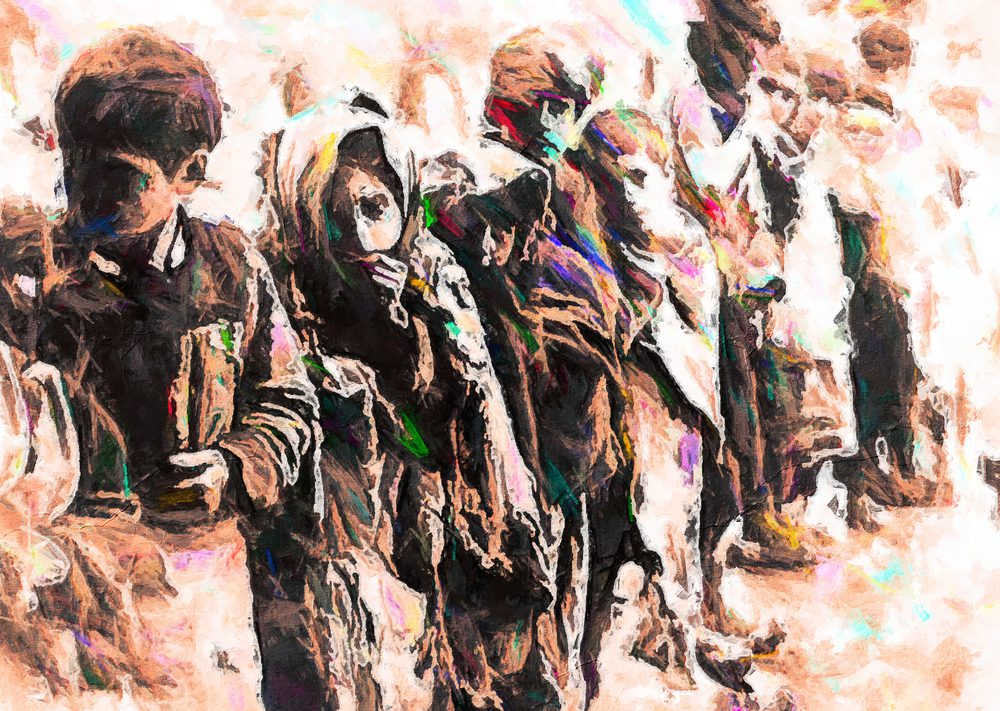
For a fortnight now, the Nagorno-Karabakh region, populated by 120,000 Armenians but under the control of Azerbaijan, has been cut off from the world by Azeri militants who have set up a blockade on the only road linking this region to Armenia. A humanitarian drama is unfolding because this road, known as the Lachin Corridor, is the only supply route for this landlocked region, which is now deprived of all resources. Indeed, since 2020, no more planes fly to and from Nagorno-Karabakh.
On December 12th, Azeri environmental activists set up a camp on the road with tents and trucks, preventing the passage of any vehicle to Nagorno-Karabakh. Officially, they are there to denounce the illegal exploitation of a gold mine by the Armenians, but there is every reason to believe that they are serving the interests of the Azeri Aliyev regime. Azerbaijan is an authoritarian country that has never tolerated the slightest demonstration for environmental reasons: the ecological motive is used only as a pretext to maintain pressure on a separatist Armenian and Christian region that has been challenging Azerbaijan’s tutelage for many years. Some so-called environmental activists are said to be close to the Grey Wolves, an ultra-nationalist Turkish group known for hunting Armenians.
This is not the first time that the blockage of this artery has been caused by the Azeris, who have been multiplying afflictions against the Armenians, for example by regularly cutting off the gas supply to Nagorno-Karabakh. But never before has the Lachin corridor been cut off for so long. Russian peacekeepers are supposed to secure the area, but for the moment they do not seem to want to intervene and Moscow’s reaction is still pending.
Officially, Azerbaijan denies any blockade and releases videos proving that vehicles are passing unhindered toward Artsakh—in reality, Red Cross vehicles are carefully screened by the Azeri authorities. On the ground, the blockade is already having a serious impact on the Armenian population: many foodstuffs are no longer available in supermarkets, and essential products such as baby nappies and petrol are running out. Patients have no access to health care and people are prevented from returning home.
The situation between Armenia and Azerbaijan, which has never really stabilised since the war between the two countries in 2020 for control of the Nagorno-Karabakh region, has deteriorated considerably in recent months. The Azeris are taking advantage of the war between Russia and Ukraine, which has resulted in the disengagement of the Russians from this region, whereas they had previously provided some protection for the Armenian population.
Editorialist Sohrab Ahmari, on his return from a trip to Nagorno-Karabakh, has written an in-depth report for Compact magazine on the situation in this region, which is bombed by the Azeris “every three days.” He reminds us that any airlift to supply the population on the spot has been made impossible because Baku is threatening to shoot down any plane that takes off or lands in Nagorno-Karabakh.
U.S. diplomatic spokesman Ned Price denounced the closure of the Lachin corridor, as did French President Emmanuel Macron, who had a phone call with Azeri President Ilham Aliyev on Friday, December 23rd, for the time being without achieving any notable results on the ground. A month ago, the French president proposed to the Azeri regime the organisation of peace talks in his presence, which Baku refused.
More than two hundred French personalities—among them the philosopher Michel Onfray, the actor Jean Reno, and the European Deputy François-Xavier Bellamy, but also many descendants of the Armenian diaspora established in France—mobilised in an open letter published in the columns of Le Figaro on Friday, December 23rd. They denounced a process of “ethnic cleansing” carried out by the government in Baku:
We are celebrating the birth of a king of poverty and straw who came to bring the warmth of his light to men. It is on this date that a dictator of oil and growth points has deliberately chosen to plunge a population into darkness and cold.
What kind of future will we offer our children if we give in to dictatorship and barbarism against one of our oldest civilisations, against a brotherly people who have been linked to us for centuries, against a people who have always contributed to the dialogue between cultures?
The authors of the article remind us that the Azeri aggressors of today have no shame in claiming the heritage of the executioners of the Armenian genocide of 1915, and this with impunity. For the time being, there is no sign of improvement, and there is no evidence that the Baku government intends to lift the blockade.
